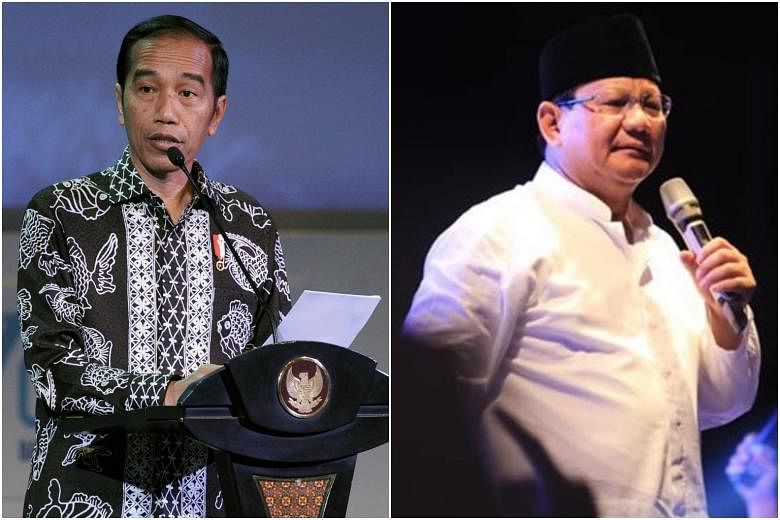JAKARTA (THE JAKARTA POST/ASIA NEWS NETWORK) - While supporters of President Joko "Jokowi" Widodo and presidential hopeful Prabowo Subianto have been trading increasingly vindictive blows online, the results of the latest survey show that personal attacks against candidates have little effect on voters' opinions of their preferred candidates.
The survey from Jakarta-based pollster Indikator Politik Indonesia, which polled 1,220 people across 34 provinces between Dec 16 and 26, found that candidate support is the largest determining factor in whether respondents give credibility to such attacks.
The respondents were asked whether they were aware of four widely spread rumors regarding the candidates: that Mr Joko's parents are Christian, that Mr Joko is of Chinese ethnicity, that the now-defunct Indonesian Communist Party (PKI) is resurgent, and that Mr Prabowo was involved in the kidnapping of pro-democracy activists between 1997 and 1998.
While the first three issues are unsubstantiated, military documents leaked in 2014 showed that that the Indonesian Military (TNI) Officers Ethics Council did discharge Mr Prabowo because of his involvement in the forced disappearances.
The survey found that 20 to 30 per cent of respondents were aware of each rumour. Of those who were aware, 20 per cent believed that Mr Joko's parents were Christian, 24 per cent believed that Mr Joko is ethnically Chinese, 85 per cent believed that the PKI posed a threat to the country, and 40 per cent believed that Mr Prabowo was involved in the kidnappings.
The poll also examined whether the reaction to the charges varied among people who described themselves as interested in politics. While those interested in politics were more likely to be aware of the rumours, the proportion of those who believed in the rumours did not change significantly.
What did matter was whether the respondents were already Joko or Prabowo supporters. Fewer than 10 per cent of Joko supporting-respondents believed that Mr Joko's parents were Christian or that Mr Joko is ethnically Chinese. In contrast, more than 80 per cent of Prabowo supporters believed both rumours.
Similarly, 65 per cent of Joko supporters believed that Mr Prabowo was involved in the activist kidnappings, while 63 per cent of Prabowo supporters did not believe this.
"This leads to the conclusion that Jokowi and Prabowo supporters are living in different worlds," Indikator's Burhanuddin Muhtadi said on Tuesday (Jan 8).
Observer Kuskridho Ambardi said that most supporters only sought out and believed information that was in line with their preconceived political views.
"All this time, political elites keep thinking about the effect of the media, and they imagine voters as a passive audience that can be bombarded with messages and moulded in that way," he said. "That's not what's happening."
He cited his experience in participating in WhatsApp groups that were dominated by Joko and Prabowo supporters, respectively.
"What happens is if there is a message from the opposition in the incumbent-supporting group, the supporters of the incumbent will just delete them, and the same thing happens in the opposition-supporting group," he said.
"While we might imagine that WhatsApp groups and the Internet would open more space for public discussion and dialogue, I think that is incorrect. What occurs are monologues, not a dialogue."
The survey results also show that there has been no significant movement in the electability of either candidate pair since the campaign period officially began in September. Mr Joko's electability fell slightly to 54.9 per cent in December, from 57.7 per cent in September, while Mr Prabowo's electability rose slightly to 34.8 per cent from 32.3 per cent. The proportion of undecided voters remained almost the same at around 9 per cent.
Joko campaign team secretary Hasto Kristiyanto said the surveys validated the campaign's focus on "ideas and positive issues".
He added that the role of political parties would also be key in determining election winners, saying: "Since these are simultaneous elections, the function of parties is very important, not just the 'air power' through social and other media but the 'territorial power'."
Prabowo campaign team deputy chairman Mardani Ali Sera, meanwhile, said that Mr Prabowo would look to use the upcoming debates "to reach out to as many (voters) as possible and let them assess and decide".
Mr Kuskridho said the best strategy for both candidates would be to target as many smaller groups as possible rather than trying to convert large groups.
"I don't think that social media is able to move any large group of people from one camp to the other."

